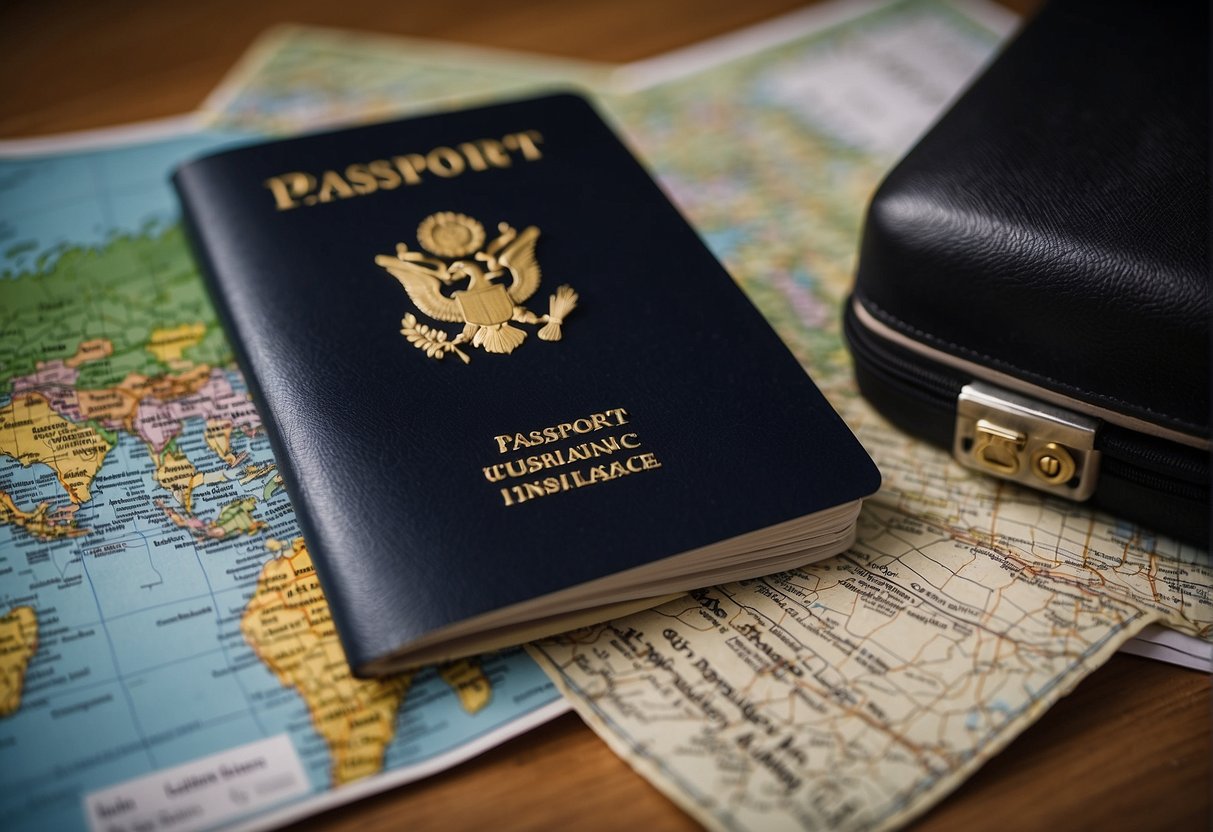Traveling internationally can offer enriching experiences and lifetime memories, but it also comes with its set of uncertainties, especially in today’s dynamic world. Health emergencies, trip cancellations, and lost luggage are just a few of the incidents that can disrupt even the most meticulously planned trips. This is why many travelers, particularly seniors, are considering travel insurance as an essential part of their travel planning. AARP provides travel insurance options designed to cater to the unique needs of its members, ensuring peace of mind when venturing abroad.

As the global landscape continuously changes due to circumstances like the Covid-19 pandemic, travel insurance has evolved to address new concerns. AARP travel insurance plans offer comprehensive coverage that safeguards travelers against unforeseen medical expenses and provides assistance during medical emergencies overseas. The benefits extend beyond health, with policies covering trip cancellations, interruptions, and even logistics associated with accommodations and travel itineraries. For AARP members, these plans are tailored to include considerations for the challenges seniors may face when traveling internationally.
Key Takeaways
- Travel insurance is essential for handling unexpected incidents during international travel.
- AARP offers specialized travel insurance policies for seniors that include coverage for medical emergencies and trip cancellations.
- Evaluating and choosing the right AARP travel insurance plan requires understanding the intricate details and benefits of the policy.
Understanding Travel Insurance
Travel insurance is a critical component for any international itinerary, providing financial protection against a myriad of potential issues. The right policy ensures peace of mind during your travels.
Types of Travel Insurance
Travel insurance policies come in various forms, catering to different aspects of your journey. Trip cancellation insurance protects your investment if you must cancel your travels due to emergencies, offering refunds for pre-paid expenses. For concerns about health, medical coverage within a travel insurance policy safeguards against unforeseen medical expenses abroad. Policies may also include provisions for lost luggage, evacuation, and even accidental death.
Evaluating Coverage Needs
Determining the right level of coverage involves assessing the nature of your trip, along with personal risk factors. Consider the total cost of your trip to decide if trip cancellation insurance is prudent. For health emergencies, verify if your existing health plan extends medical insurance for international travel, or if an additional policy is necessary. Always review the policy details to understand limitations and exclusions, ensuring that the coverage aligns with your specific travel needs.
AARP Travel Insurance Options

AARP offers an array of travel insurance options catered to meet the needs of international travelers, working with reputable insurers to provide coverage that adds a layer of financial protection for various unforeseen events.
International Insurance Plans
International travel insurance plans endorsed by AARP can range from basic to comprehensive coverage. They may cover trip cancellation, emergency medical expenses, and evacuation. It’s important for travelers to assess their needs and choose a plan that fits their itinerary and budget. Available through the AARP Travel Center, these plans aim to offer peace of mind to travelers heading overseas.
Benefits of AARP-Endorsed Plans
The benefits of opting for AARP-endorsed international travel insurance plans are multi-fold:
- Medical Coverage: Should a medical emergency arise, AARP-endorsed plans typically cover medical treatment, providing financial relief during stressful situations.
- Trip Cancellation: Plans often include compensation for trip cancellations, ensuring that travelers can recuperate non-refundable expenses.
- Customer Support: Assistance is usually available 24/7, allowing travelers to get help when they need it the most.
Travelers should always review the terms carefully to fully understand the coverage provided by their chosen insurance plan.
Trip Planning with AARP

When planning a trip, AARP members have access to a plethora of resources that can assist them in choosing destinations and making bookings. These tools are tailored to enhance the travel experience for the mature traveler, allowing them to plan their journey with confidence and ease.
Choosing Destinations
A traveler’s choice of destination is greatly influenced by accurate and current information. AARP provides its members with insights into various destinations, including any potential travel restrictions and taxes for the year 2024 and beyond. Members can find data projecting international tourist figures to reach 1.8 billion by 2030. By understanding these trends and regulatory elements, travelers can make informed decisions on where to go, and when might be the best time to visit certain locations.
Booking Recommendations
For the actual booking process, AARP ensures that its members receive recommendations that are beneficial both in terms of convenience and savings. Whether it’s a getaway in a particular month or a retreat planned on a specific date, members can enjoy exclusive travel planning benefits such as discounts on off-airport parking reservations and passport renewal bundles. Additionally, AARP’s Travel Center, powered by Expedia, offers up to 10% off select hotels, easing the financial aspect of travel. These precisely targeted benefits aim to provide a seamless booking experience for the traveler.
Covid-19 and Travel Safety
Traveling during the Covid-19 pandemic has introduced new considerations for safety and insurance. Understanding these aspects is essential for any international journey.
Insurance Coverage in the Pandemic
Travel insurance has adapted to include Covid-19 coverage, addressing the risks associated with health emergencies abroad. It is crucial for travelers to confirm that their insurance policies cover medical expenses and evacuation in case of Covid-19 infection.
- Medical Expense Benefits: Ensure policies offer substantial coverage for treatments.
- Medical Evacuation: Verify there is adequate coverage for possible repatriation.
- Cancellation Policy: Check if the insurance offers cancel for any reason benefits to account for the unpredictability of the pandemic.
Safety Tips for Travelers
Adhering to global and local health guidelines is imperative for international travel during the pandemic.
- Immunizations: Stay informed about required vaccinations for travel to your destination.
- Testing Requirements: Understand and comply with pre-departure and return Covid-19 testing regulations.
- Hygiene Practices: Maintain frequent hand washing and the use of hand sanitizers.
- Wearing Masks: Use masks in crowded or enclosed spaces, especially where social distancing is not possible.
Travelers need to proactively manage their health and stay informed about the evolving travel restrictions to ensure safety during international travel amidst Covid-19.
Dealing with Trip Cancellations

When a traveler faces the need to cancel a trip, understanding the intricacies of cancellation policies and navigating the insurance claims process is crucial. These steps ensure that they are adequately compensated according to their trip insurance coverage terms.
Cancellation Policies
The conditions under which a traveler can cancel their trip and receive a refund are defined by the cancellation policy. This policy varies between insurers but typically covers events like illness, family emergencies, or unforeseen circumstances. To invoke a cancellation policy, the reason must be listed as a covered peril within the traveler’s insurance policy. It’s essential to review the policy details to determine what is considered a valid reason for cancellation.
Examples of covered reasons:
- Sudden medical emergencies
- Death in the family
- Severe weather disrupting travel plans
Non-covered reasons might include:
- Change of mind
- Pre-existing medical conditions (unless otherwise specified)
Note: Travelers should review the specifics of their policy since coverage can vary greatly.
Insurance Claims Process
Once a traveler establishes that their reason for cancellation is covered, they should initiate the claims process by contacting customer support as outlined by their insurance provider. The process typically involves submitting a claim form and providing supporting documents to substantiate the reason for cancellation.
Required documentation may include:
- Medical records or death certificates
- Documentation of unforeseen events like natural disasters
- Proof of expenses and payments made
Claims are evaluated on a case-by-case basis, with the reimbursement amount subject to the terms of the policy. It is imperative for the claimant to provide thorough and accurate documentation to facilitate a smooth claims process.
Accommodations and Logistics

When it comes to international travel, selecting the right accommodations and arranging transportation are crucial steps in planning a successful trip. AARP members can benefit from exclusive discounts and deals which can enhance the travel experience for both adults and children, including those under 2 years of age.
Hotels and Resorts
AARP collaborates with various hotel chains, including Wyndham, to provide members with special rates on accommodations. Whether one seeks a luxury suite or a comfortable room for a family stay, travelers can enjoy up to 10% off select hotels. It is important for travelers to consider location, accessibility, and the amenities offered when booking hotels and resorts to ensure a pleasant and convenient stay.
- Location: Choose hotels close to your destination’s attractions or business hubs.
- Amenities: Look for complimentary breakfast, free WiFi, and other amenities that can enhance your stay.
- Accessibility: Ensure the hotel provides transportation services or is located near public transit options.
Transportation Arrangements
Securing timely and reliable transportation is central to a smooth travel experience. AARP provides resources for booking flights, where members might obtain discounts ranging from $65-$200 off round-trip tickets purchased online. When considering flights, adults traveling with children or an infant under 2 should verify the airline’s policies for family travel to ensure all needs are met.
- Flights: Choose flights with beneficial rates for AARP members and appropriate provisions for younger travelers.
- Ground Transportation: Determine whether a rental car, shuttle service, or public transport best fits your itinerary and budget.
- International Travel: Ensure your mobile plan has international coverage or consider obtaining an international travel phone plan for seamless communication.
By addressing both accommodations and logistics with attention to these details, travelers can lay a solid foundation for a trouble-free international journey.
Protecting Your Valuables

When traveling, safeguarding one’s belongings is crucial. Travel insurance and homeowners policies offer certain protections that can be vital in mitigating the financial loss of valuable items.
Insurance for Lost Luggage
Travel insurance often includes coverage for lost luggage, providing a safety net if one’s belongings are misplaced during transit. For instance, some policies cover the replacement of the contents of lost bags as well as reimbursement for emergency purchases. To file a claim, they typically require a detailed report from the airline or transportation provider confirming the loss.
- Coverage Limits: Policies have specific limits on payouts for lost luggage.
- Documentation: Save purchase receipts; they may be required to substantiate a claim.
Homeowners Policy and Travel
A homeowners policy can extend to personal property lost while traveling. However, the coverage may be subject to the policy’s deductible and limits.
- Off-Premises Coverage: Personal belongings are often covered worldwide, but it’s essential to confirm with the provider.
- Damage or Theft: While a homeowners policy may cover stolen personal items, some high-value items might require additional riders for full protection.
In summary, it is vital to assess individual needs and understand the extent of coverage provided by travel insurance and homeowners policies. Reading both policies carefully to understand their terms and exclusions can prevent surprises and provide peace of mind while traveling.
Special Considerations for Seniors

When considering international travel, seniors must pay careful attention to their medical coverage and any pre-existing conditions that could affect their journey. This is especially relevant when obtaining travel insurance, as seniors often need more comprehensive coverage.
Medical Coverage
Seniors should ensure their travel insurance offers substantial medical coverage, as health emergencies can occur unexpectedly, leading to significant medical bills. AARP often recommends such coverage simply because Medicare may not provide adequate coverage internationally. Thorough travel insurance can fill this gap, covering expenses for hospital stays, medical treatments, and even medical evacuation if necessary. It’s crucial to verify the specifics of what the policy covers, particularly when traveling abroad.
Traveling with Pre-Existing Conditions
Many seniors travel with pre-existing conditions, which makes finding the right insurance policy a critical step. It’s important to find a travel insurance plan that specifically covers pre-existing conditions to avoid any potential financial strain. Travelers should be aware that not all policies include this coverage automatically. Declarations must be made, and sometimes, additional screenings are required. Researching and opting for a policy that covers pre-existing conditions can prevent unexpected costs related to health issues that may arise. For members of Kaiser Permanente, it’s advisable to look into whether they offer international coverage that accommodates these pre-existing health concerns.
Making Informed Insurance Choices

When exploring international travel insurance, it’s crucial to make decisions based on thorough comparisons and credible expert evaluations. These steps ensure that the chosen policy appropriately covers your needs.
Comparison Shopping
Consumers should start by examining various policies available through comparators like SquareMouth or platforms like InsureMyTrip.com. It’s important to assess the coverage details and premiums to find a policy that balances cost with comprehensive protection. For example, Megan Moncrief from SquareMouth emphasizes the importance of understanding the nuances of each policy before making a selection. When searching for the best international travel insurance, ensure that the policy covers medical expenses, trip cancellation, lost luggage, and other potential mishaps.
Consulting Expert Reviews
In addition to personal research, consulting expert reviews can provide an additional layer of confirmation. Organizations like the Consumer Federation of America often review and rate travel insurance policies, bringing to light the strengths and weaknesses of various offerings. For those seeking to make an informed choice, reviews such as these can be pivotal. Understanding the fine print and service ratings of a travel insurance policy is also essential, as clarity on these helps avoid unexpected disappointments during a crisis. Midwest Luxury Publishing and Groom Lake Media might also provide analyses and insights into the value of different travel insurance products available on the market.
Travel Etiquette and Practices

Traveling can be both exhilarating and stressful, but abiding by certain etiquette can significantly improve the experience for oneself and fellow travelers. Grasping the nuances of behavior on flights and hotel stays is imperative to navigating the complexities of international travel.
Behavior on Flights
- Adults and Children: Adults are expected to act as role models for children during a flight. It’s important for adults to ensure that children remain seated and their activities do not disrupt the comfort of other passengers. For children under a certain age, typically two years, the option to fly in lap or in seat with an appropriate child restraint system exists—decisions here often hinge on both safety and airline policies.
- Group Travel: Traveling with a group, particularly when you have more than 6 people total, necessitates prior coordination with the airline to facilitate seating arrangements and ensure smooth boarding.
For detailed etiquette guidelines while flying, consider reviewing Good Airline Etiquette.
Hotel Stay Etiquette
- Booking Rooms: When booking hotel rooms, especially for large groups or families, clarify the number of travelers and room needs, including the provision of extra beds if necessary.
- Hotel Conduct: All travelers are expected to respect hotel property, abide by check-in and check-out times, and maintain decorum in common areas to ensure a serene environment for all guests.
Exploration of international travel etiquette can enhance your journey and reflects respect for the cultures and practices encountered on your travels.
Practical Travel Tips

When planning international travel, certain practical tips ensure a smooth experience from packing to navigating airports and accommodations.
Packing Essentials
Packing for an international trip requires careful consideration of luggage content. One should ensure that all essential documents, like passport and airline tickets, are easily accessible. For a streamlined packing list, travelers can consult an international travel pack list. Items should be versatile and appropriate for the destination’s climate and cultural norms.
- Clothing: Pack clothes that can be layered and are suitable for various occasions.
- Electronics: Chargers and travel adapters for different outlets.
- Personal items: Minimal toiletries, medications, and travel-sized essentials.
Navigating Airports and Hotels
Airports present a maze of check-ins, security, and gate changes. Staying informed about the flight status and airport layout reduces stress. Upon arrival, understanding the essentials for international travel can streamline the transition from the airport to hotel accommodations.
- Flight monitoring: Use apps to check real-time flight changes.
- Hotel transition: Plan transportation from the airport to your hotel ahead of time.
In summary, a sound understanding of packing essentials and the dynamics of airports and hotels aids in a hassle-free journey. For more detailed insights on how to pack effectively, consider using a travel checklist for international travel. With proper preparation, travelers can focus on the excitement of their upcoming international experiences.
Understanding Policy Fine Print

When purchasing travel insurance, the clarity in understanding the policy’s fine print is crucial. It dictates the extent of coverage and the limitations thereof, ensuring policyholders are aware of their rights and the insurer’s obligations.
Reading the Contract
The key document that should be thoroughly reviewed before committing to a travel insurance policy is the contract. It outlines all the terms and conditions that govern the coverage. Policyholders must look for specifics such as the coverage caps, which indicate the maximum amount the insurer will pay for claims, and required time delays which can affect the admissibility of a claim for events such as baggage loss or trip cancellation.
Identifying Exclusions
Exclusions in a travel insurance policy are scenarios or circumstances where coverage is not provided. These exclusions may include pre-existing medical conditions or injuries sustained from high-risk activities. For example, when examining AARP’s travel insurance offerings, policyholders should pay special attention to how the policy defines a ‘terrorist act,’ as the definition and time frame in which the act occurred relative to the trip’s schedule could drastically influence the coverage. Identifying these exclusions is essential to ensure there are no surprises during the claims process.
Budgeting for Your Trip

When planning travel with AARP, it is essential to meticulously estimate the overall cost of the trip, including accommodations and flights, to ensure a budget-friendly experience to the chosen destination.
Estimating Total Costs
Accommodation: Determining the cost of room accommodations depends on the destination and the type of lodging AARP members prefer. Prices can vary significantly, from budget-friendly hotels to more luxurious options. Members should research AARP’s travel benefits for potential discounts on accommodations.
- Flight Costs: Airfare is often a substantial part of a travel budget. Prices fluctuate based on the season, demand, and how far in advance tickets are purchased. AARP members can take advantage of exclusive flight discounts through AARP Travel Center Powered by Expedia.
Finding Discounts and Rewards
Members can reduce travel expenses significantly by accessing special travel discounts through AARP. For example, members can save up to 30% off on base rates for car rentals and even more on other travel deals.
- AARP Discounts: Utilize reductions in costs with AARP’s negotiated travel discounts. This can include savings on hotel bookings, car rentals, cruises, and package tours.
- Rewards Programs: Travelers should also look into rewards programs offered by airlines, hotels, and car rental companies, which can provide perks like free nights or flight upgrades that further offset costs.
Emergency Services Abroad
When traveling internationally, access to prompt health emergency care and medical coverage contingency plans are essential. Obtaining comprehensive travel insurance can be the difference between a minor hiccup and a major ordeal.
Access to Health Care
In a health emergency, immediate access to health care is critical. Travel insurance often includes access to a network of hospitals and doctors. Policyholders typically receive assistance in locating the nearest medical facilities, ensuring they receive care when needed. Confirm that your trip insurance covers health emergencies to avoid substantial out-of-pocket costs.
Emergency Evacuations
In the event of a serious medical emergency or local crisis, evacuation to a facility capable of providing appropriate care or repatriation may be necessary. Emergency evacuations can be logistically complex and expensive, with costs easily running into the tens of thousands of dollars. It is crucial that your medical coverage includes sufficient emergency evacuation benefits, not only covering the cost but also providing support during transportation arrangements. Check if your policy’s coverage includes flights back to your home country if medically necessary.
Seasonal Travel Considerations

When planning international travel with AARP options, travelers should consider the fluctuating factors that come with different seasons, including weather patterns and travel insurance requirements, especially in light of the Covid-19 pandemic.
Best Times to Travel
- Spring (March-May): During these months, destinations such as Japan or the Netherlands are ideal, with attractions like cherry blossoms and tulip fields. Travel insurance rates can be competitive, so travelers should book in advance.
- Summer (June-August): European destinations like France and Italy are popular. Travel insurance may include higher premiums due to peak tourist season, and one should be mindful of the potential Covid-19 restrictions that might fluctuate.
- Autumn (September-November): Destinations like New Zealand and Argentina are entering their prime. It’s a good period to find reasonable travel insurance rates before the holiday season rush.
- Winter (December-February): For those seeking winter escapes, locations like Thailand offer warm climates, while others may wish for snow in Switzerland. Always check for weather-related coverage in travel insurance policies during these months due to higher risks of delays and cancellations.
Season-Specific Insurance Tips
Travelers need to consider season-specific variables that can affect their travel insurance choices:
- Hurricane Season (June-November): For tropical destinations, comprehensive travel insurance that covers weather-related cancellations is vital.
- Covid-19 Considerations: Some countries might mandate proof of health insurance during the pandemic, and policies should cover Covid-19 related medical expenses and trip alterations.
- Ski Season: If the destination involves winter sports, travelers need to ensure that their policy includes coverage for sports-related injuries and equipment loss.
- Cultural / National Events: Major events can affect travel insurance costs. Policies should be secured well before dates like Carnival in Brazil or Lunar New Year in several Asian countries to avoid inflated rates.
Frequently Asked Questions

When considering AARP travel insurance for international travel, one must be informed about the coverage options, cost comparisons, and member services. These common inquiries provide insight into what travelers can expect when choosing AARP for their insurance needs.
What are the benefits of choosing AARP travel insurance for international trips?
AARP travel insurance typically offers comprehensive coverage which can include trip cancellation, medical emergencies, and baggage protection for international trips. This can ensure travelers are protected against unexpected events.
How do AARP travel insurance international costs compare to other providers?
Costs for AARP’s international travel insurance are competitive and may offer better value, especially for AARP members who can take advantage of members-only discounts and benefits. It’s crucial to compare the costs against the coverage levels provided.
What do reviews say about the coverage and services provided by AARP international travel insurance?
Reviews often highlight AARP’s reliable coverage and customer service. Customers appreciate the peace of mind provided by AARP’s support and comprehensive international travel insurance options.
Can seniors receive assistance with travel plans through AARP when traveling abroad?
Yes, AARP offers travel planning resources and assistance for seniors. These services include advice on medical insurance for international travel, helping ensure travelers have the necessary coverage while abroad.
How does Medicare supplement insurance from AARP work when traveling outside the United States?
Medicare supplement insurance through AARP can provide additional coverage for health care services required while traveling outside the U.S., however, there are limitations and conditions that apply. It is advisable to review the terms of the Medicare supplement insurance plans before departing.
What should one consider when looking for the best travel insurance for international trips?
One should consider the extent of coverage including medical and evacuation, coverage for trip interruptions and cancellations, as well as the provider’s reputation and customer service. It’s recommended to seek options like AARP’s that combine extensive coverage with specialized support for travelers.
Leave a Reply